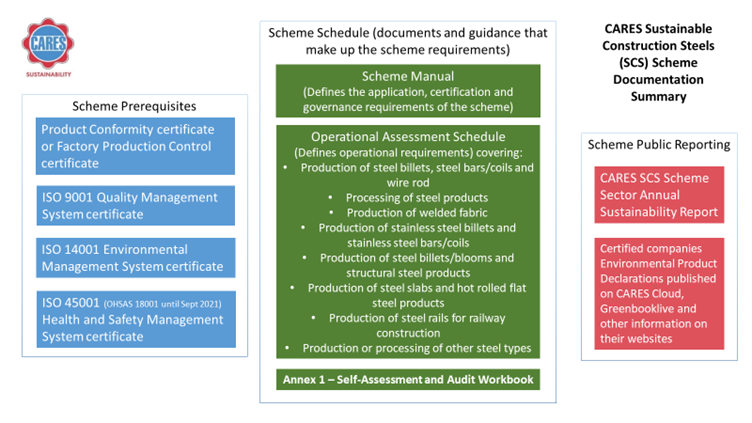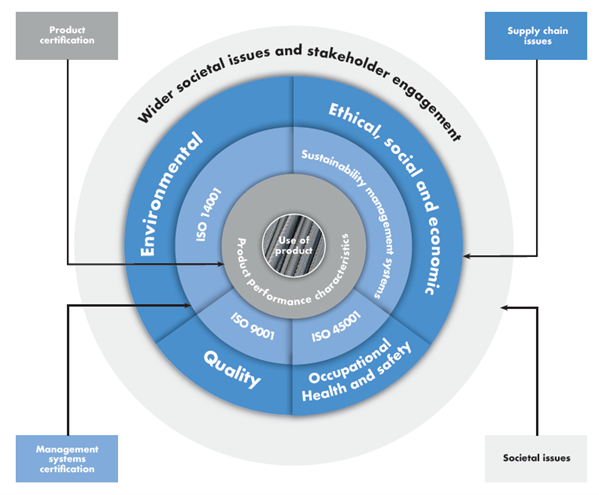Sustainable Constructional Steel scheme
What is sustainable constructional steel certification?
The CARES Sustainable Constructional Steels (SCS) scheme is an accredited, independent and impartial certification scheme with the objective of improving the environmental, social and economic management of steel producers and processors as well as improving the performance of products. Launched in 2009, its 9th version was released in 2020.
These products include reinforcing carbon steel, reinforcing stainless steel, other structural steels, hot rolled flat steel, steel rail and other steels used in construction and infrastructure. It applies to primary producers of steel and fabricators who process steel into building products used in construction projects.
Informed by stakeholder input, the goal of the scheme is to provide a robust and transparent mechanism which clearly, and simply, communicates the overall sustainability performance of constructional steel products to designers, specifiers and clients. It has minimum mandatory requirements as well as credit requirements to incentivise and recognise better performance.

Value of the scheme
Constructional steel forms a significant part of any major construction project. The supply chain for constructional steel: raw materials, production, distribution, processing and delivery to a construction site, is complex. At each stage in the supply chain, steel is transferred from one company to another. Confidence within purchasing and effective local management of the supply chain are essential to ensure construction projects are delivered on time, on budget and to specification.
Constructional steel producers and processors are coming under increasing pressure to take proactive steps which reflect the environmental, social, ethical and economic impacts of their operations and products. Buyers’ purchasing decisions are increasingly driven by efforts to ensure positive impacts and reduce any negative social, environmental and economic impacts.
The CARES approach relies on responsible sourcing of raw materials, full product traceability and a digital record, providing a 'chain of custody,' across the entire process from producer to the end-user. It provides confidence to client’s procurement teams, specifiers and construction consultants that the certification process has verified a broad range of requirements without them having to repeat any part of the process. Certified performance data becomes available to them to inform their decision making.
Company-specific verified EPD
One key feature and benefit of the CARES Sustainability Scheme is independently validated carbon footprint data and an advanced EN 15804 Lifecycle assessment (LCA) calculator which results in company-specific verified Environmental Product Declarations (EPD’s) to EN 15804. Further to CARES validation of the data, BRE Global provide an additional, 3rd party and independent, layer of verification with all EPD reports published on BRE Global’s ‘GreenBookLive’ website
Scheme basis and principles
The concept of ‘Materiality’ – the issues and impacts that are most significant and relevant to each organisation and stakeholders along the entire value chain – is used to inform the selection and prioritisation of issue management. Companies must demonstrate effective, systematic management of these (and other relevant issues) as well as improved performance. Stakeholder inclusion and opinion must be regularly monitored in support of continuous improvement in sustainability performance.
The scheme builds on the full product traceability requirements defined by its product certification schemes. The principles from BS 8902:2009; inclusivity, integrity, stewardship and transparency provide the basis for the CARES SCS Scheme and its accreditation. Companies must demonstrate how these are incorporated into their management practices. They are also assessed against a series of criteria covering ethical, environment; social and economic impacts. Companies are required to report and demonstrate continual improvement in their sustainability performance. Companies can map themselves against a maturity matrix according to BS 8902:2009, which provides characteristics that demonstrate an evolution of management practices, enabling organisations to track their progress over time.

List of CARES SCS scheme stakeholders:
- Construction Industry Specifiers
- Construction Industry Contractors
- Building and Infrastructure Users
- Steel Manufacturer (Producer)
- Construction Steel Products Manufacturer (Processor/Fabricator)
- CARES Board
- CARES SCS Scheme Sustainability Committee Members
- CARES Policy Advisory Committee (PAC) members and Chair’s nominees
- CARES staff and contractors
- Steel industry bodies, including World Steel Association
- World Green Building Council and regional Green Building Councils
- Construction industry evaluation and certification bodies, including BREEAM, LEED, ESTIDAMA, Pearl, Greenstar and other regional organisations that manage building design criteria and evaluations
- Accreditation bodies including UKAS and SAC
- Competitor Certification Bodies
- Broader construction materials industry bodies and companies
- Communities near steel manufacturers, processors and suppliers
- Non-Governmental Organisations representing environmental, social and economic interests
- Governments and politicians
- Workers within the construction and steel industries
- Clients, specifiers and users of buildings and infrastructure
- Enforcement agencies that represent compliance interests relating to environmental, occupational health and safety and other sustainability aspects
- Standard development organisations
- Sustainability Practitioners
- 3rd party verification bodies for EPDs
- Building research bodies and standards developers, e.g. BRE
Accreditation and recognitions
CARES SCS scheme is accredited to BS 8902:2009 (Responsible Sourcing Sector Certification Schemes for Construction Products) by the United Kingdom Accreditation Service (UKAS).
BREEAM is the UK’s most prominent green building rating system. The CARES Sustainability Scheme has been assessed by BRE Global, against the requirements for responsible sourcing and is recognised by BREEAM New Construction 2018. CARES verified EPD’s are acceptable evidence under the LEED Building assessment methodology. CARES satisfies the requirements of the CIC Green Product Certification (ex-Carbon Labelling Scheme) in Hong-Kong and products certified by UK CARES SCS Scheme can be used as inputs for the certification’s applications.
It is specified across major projects in the UK, Middle-East and Asia.
What are the prerequisites for sustainable steel certification?
- Product conformity certificate(s): Responsibility for the sustainable constructional steel supply chain placed upon a core benefit of SCS product for reinforcing concrete, or for its use in a built structure. There are also other attributes relating to a product’s performance, e.g. strength and ductility, which are stated in relevant product standard, and hence constitute the 'specified product'. Those must be demonstrated with relevant product conformity certification of steel for the reinforcement of concrete and/or feedstock material for the production of steel for the reinforcement of concrete; or factory production control certificate in case of structural steels and hot rolled flat steels.
- Quality management system certified to ISO 9001:2015;
- Environmental management system certified to ISO 14001: 2015;
- Health and safety management system certified to ISO 45001:2018 (or OHSAS 18001 until its withdrawal on 30th September 2021)
- A traceability mechanism: upstream back to suppliers; downstream to end users, controlled blending Chain of Custody Model in production and identity preserved Chain of Custody model from production to use in construction site.
How do you achieve certification?
For those firms eligible to apply for certification by fulfilling the prerequisite requirements, the assessment procedure commences with a detailed review of their Sustainability Management System Manual (or equivalent manual(s)) against the requirements of CARES’ SCS Scheme. Following the provision of the Sustainability Management System Manual, (or equivalent manual), meeting the requirements of CARES’ SCS Scheme, the company’s product, quality, environmental, health and safety and sustainability management systems are all reviewed. A two-stage audit process is then carried out, through a thorough review of evidence and the verification of data on site against a self-assessment workbook including a series of Key Performance Indicators and the Environmental Product Declaration (EPD) dataset. CARES auditors audit over 100 criteria developed by a group of industry experts that cover the entire supply chain from raw materials, through production of the constructional steel, its processing to the delivery of the finished product to the construction site.
The assessment team may comprise one or more competent auditors depending upon the size and complexity of the firm's activities. After a successful assessment, recommendation of certification and the payment of fees a Certificate of Approval will be issued.
The supplier remains responsible for compliance with legal requirements, voluntary commitments (for example compliance with the ILO standards, the declaration of human rights, its own public commitments) and standards and applying best practices as far as is reasonably practicable. The scheme enables credits to be obtained for achievements beyond compliance and minimum thresholds. Credits can be gained for performance that meets specified criteria above the mandatory certification level as part of the CARES ‘Rosette Rating System’. Beyond basic certification, there are 4 additional performance levels reflecting good, better, best practice and aspirational ‘sustainable’ steel (1, 2, 3 or 4 Rosettes).
CARES collects, audits, collates and reports the sector sustainability performance data in line with requirements set out in BS 8902 - Responsible Sourcing of Construction Products and the Scheme Principles.
Please contact us to obtain guidance if you wish to apply or discuss the scheme.
Why choose CARES?
CARES, together with the wider constructional steel industry and other stakeholders, have developed an objective and workable approach to the identification, collection, auditing and reporting of sustainability data and management system processes to deliver continual performance improvement. The Scheme uses industry best practice and International Standards throughout the whole constructional steel supply chain.
Achieving certification to CARES SCS requires considerable effort and commitment from a company. It is often the beginning of improved process and business performance. CARES provide free marketing support to promote successful certification and allows a certificated firm to display the relevant CARES "sustainability mark" on publicity and stationery. All approved companies are automatically included in the CARES Approved Firms section of this website.
Having invested so much time and effort in a management system which includes the requirements of ISO 9001, ISO14001 and ISO 45001 (or OHSAS 18001 until its withdrawal on 30th September 2021) as well as rigorously reviewing and controlling processes to a level which assures consistent achievement of product compliance, there is enormous value in entrusting this assessment to a certification body that understands constructional steel products, processes and supply chain.
For all responsible stakeholders engaged in the sector the fundamental goal of CARES Approved Sustainable Constructional Steel producers and processors is to help deliver more sustainable construction and infrastructure across the entire global supply chain.
Scheme documentation and downloads
Reference documents
 Cares Constructional Steels Specifying Guide and Briefing Sept 2020 (PDF)
Cares Constructional Steels Specifying Guide and Briefing Sept 2020 (PDF)
 CARES Sector Average EPD Report for Constructional Steels Issue 2 April 2020
CARES Sector Average EPD Report for Constructional Steels Issue 2 April 2020
 CARES Benefits of Sustainable Constructional Steels Certification
CARES Benefits of Sustainable Constructional Steels Certification
 CARES Sustainability Report (2020)
CARES Sustainability Report (2020)
 CARES Sustainability Report (2019)
CARES Sustainability Report (2019)
 CARES Sustainability Report (2018)
CARES Sustainability Report (2018)
 CARES Sustainability Report (2017)
CARES Sustainability Report (2017)
 CARES Sustainability Report (2016)
CARES Sustainability Report (2016)
 CARES Sustainability Report (2015)
CARES Sustainability Report (2015)
 CARES Sustainability Report (2014)
CARES Sustainability Report (2014)
 CARES Sustainability Report (2013)
CARES Sustainability Report (2013)
 CARES Sustainability Report (2012)
CARES Sustainability Report (2012)
 CARES SCS scheme audit results 2020
CARES SCS scheme audit results 2020
 CARES SCS scheme audit results 2019
CARES SCS scheme audit results 2019
 CARES SCS scheme audit results 2018
CARES SCS scheme audit results 2018
 CARES SCS scheme audit results 2017
CARES SCS scheme audit results 2017

